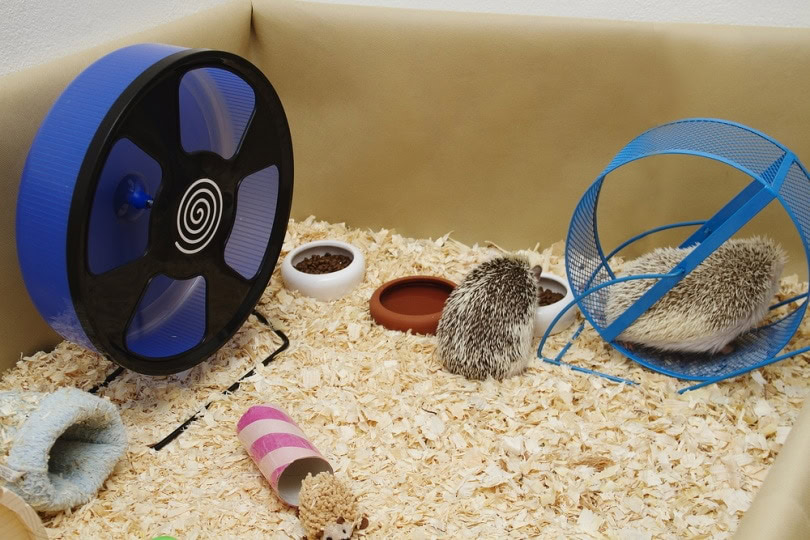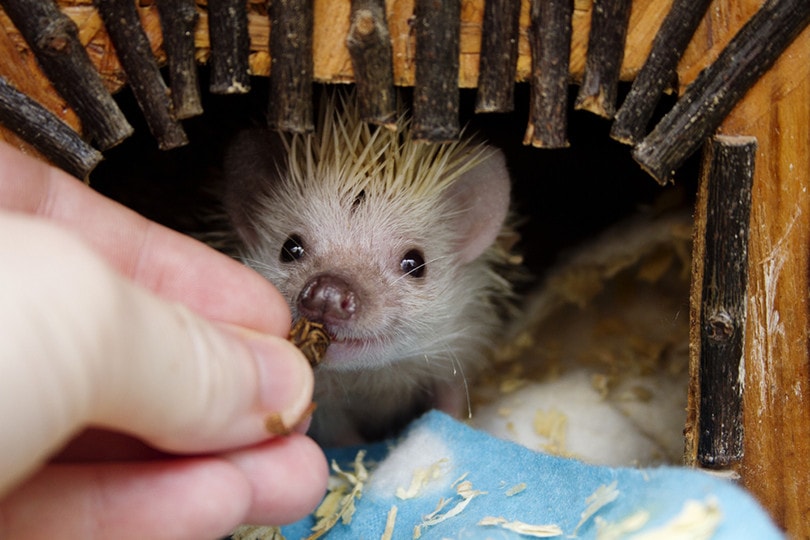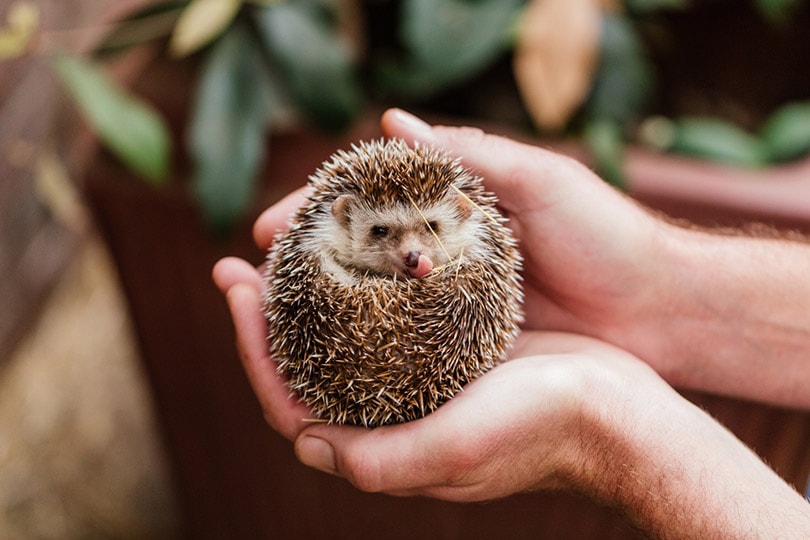VET APPROVED

The information is current and up-to-date in accordance with the latest veterinarian research.
Learn more »Click to Skip Ahead
If you’re a hedgehog owner, you know how much they like to eat. These little creatures usually eat at night, and if your hedgehog is not eating at all, there may be cause for alarm.
Depending on the species, hedgehogs can live for up to 10 years as pets, but to do so, they require a healthy diet and a healthy environment.
A few factors could be the cause of your hedgie’s inability to eat. In this article, we’ll examine the possible factors in depth so that you can get your spiny friend back on track.

The 6 Reasons Your Hedgehog Is Not Eating
1. Change in Environment
If you have just brought your hedgie home, then the change in their environment may be the culprit, and it’s a common reason why a hedgie may not eat right away. When placed in a new and unfamiliar place, a hedgie may skip eating for a time or two, and as time passes, your hedgie should get more comfortable and have an appetite. In the beginning, they will probably explore their new surroundings, which means they won’t make the time to eat.
A hedgehog should not go more than three days without food. Ensuring that your hedgie has access to food and water at all times is extremely important. Anecdotally, some people claim that you may want to get your hedgie acclimated to their new environment first before placing a running wheel in their cage, too, as the wheel may be too much of a distraction initially. However, there is no scientific evidence for this claim.
When looking at a particular hedgehog in a pet store, ask the staff what its favorite treat is and be sure to have that item on hand. Using their favorite food is a good way to entice them to eat. You can also try feeding baby food designed specifically for hedgehogs for the first couple of days.

2. Change In Diet
If you have changed your hedgehog’s food, that may be the cause; your hedgie may simply dislike the food and refuse to eat it. When buying a hedgehog, it’s best to initially stick with whatever food the pet store is feeding, especially if the hedgehog is doing well on the food.
Feeding high-quality hedgehog food is essential in keeping your hedgie healthy. Hedgehogs require a high-protein diet. When purchasing food for your pet, it is best to opt for food made specifically for hedgehogs and not other species.
Always avoid giving your hedgie foods that are on the no-no list, such as grapes, raisins, citrus fruits, avocados, tomatoes, dried fruits, or processed meats.
3. Cage Temperature
If the temperature is not set at an ideal range, your hedgehog may stop eating. Hedgehogs are sensitive to fluctuations in temperature, and inconsistent temps may provoke your hedgie to go into a hibernation-type state, which means it will stop eating.
The ideal ambient temperature range for a hedgehog is 70–80 F (21.1–26.7 C).

4. Food Bias
If you offer your hedgehog a buffet of items/insects to eat all the time, they will quickly pick and choose their favorites and develop a bias for their preferred foods. Consequently, they may begin to reject eating other foods and only eat the foods they prefer. This problem is very difficult to circumvent once it sets in and as such, it’s very important to properly plan out your pet’s nutrition and meals prior to adopting them.
5. Poor Water Quality
If your hedgie is not eating, take a look at the water source. If the water bottle in their cage is clogged, your hedgie will eventually get dehydrated and stop eating. You can also place a water dish in their cage to ensure they have another water source.

6. Injury or Illness
Hedgehogs that are sick or have an injury will not eat. If you’ve checked the above possible reasons and cannot pinpoint the problem, you’ll need to contact your veterinarian immediately.
Hedgies are prone to certain diseases that can be fatal or extremely debilitating if left untreated. Most of the time, a hedgehog will not show any symptoms other than not eating because they can hide illnesses very well. As a rule of thumb, when in doubt, always contact your veterinarian.

How to Get Your Hedgehog to Eat
Hedgehogs love insects, such as crickets and mealworms. Insects contain chitin, which is the main part of the exoskeleton of insects. Chitin contains fiber and is vital in the overall health of your hedgie. Hedgehog food has this ingredient, but if you ever want to buy live insects for your hedgie as a treat, buying from a pet store with hedgehog knowledge is the generally recommended method. Insects from bait shops may have pesticides on them, which will definitely make your hedgie sick. Another reasonable alternative is to breed and raise your own batch of insects to feed your pet.


Summary
Owning a hedgehog takes some work but can be very rewarding. You have to ensure its cage is set at the appropriate temperatures and that they have access to fresh water at all times. Never feed your hedgie toxic foods, and when in doubt, always consult your veterinarian if your hedgie is not eating or drinking.
Related Reads:
- Why Do Hedgehogs Burrow? 5 Possible Reasons
- How Long Are Hedgehogs Pregnant? Hedgehog Pregnancy Explained
- How to Get Rid of Hedgehog Smell (7 Ideas and Tips)
- https://vcahospitals.com/know-your-pet/hedgehogs-diseases
- http://hedgehogheadquarters.com/secure/treats.htm
- https://www.hedgehogworld.com/what-do-hedgehogs-eat/
- https://www.avianexoticvetcare.com/handouts/small-mammals/hedgehogs.pdf
- https://www.hedgehogstreet.org/about-hedgehogs/hibernation/
- http://www.hedgehog-rescue.org.uk/diagnosis.php
- https://veterinarypartner.vin.com/default.aspx?pid=19239&catId=102923&id=9926296
- https://www.dvm360.com/view/diseases-and-treatment-pet-hedgehogs-proceedings
- https://academic.oup.com/jn/article/128/12/2671S/4724330
Featured Image Credit: Julia Jane, Shutterstock










